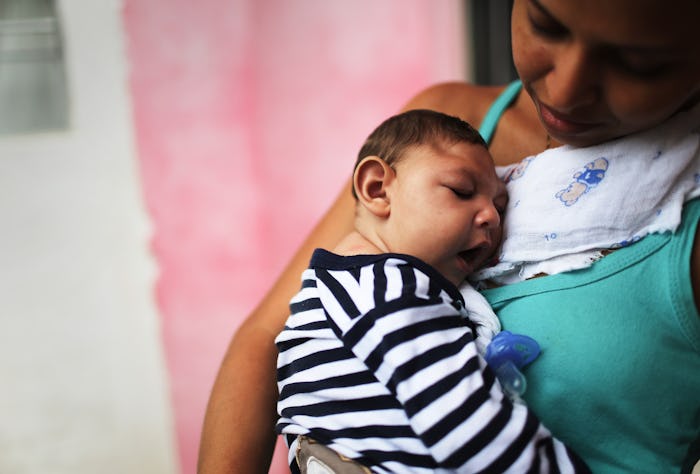Life

Americans Are Less Concerned About Zika Than Ebola, Even As US Infections Skyrocket
Most states have yet to enter the worst of the mosquito season, and the Zika virus is already casting a pretty frightening shadow. As of May 25, 591 Americans have contracted Zika, according to the Centers for Disease Control; and in the U.S. territories, the number of infected is as high as 935. The explosive nature of the virus has led some to compare the threat of Zika to the Ebola outbreaks in 2014. But, despite the concern that Ebola elicited from the public two years ago, Americans are less concerned about Zika than Ebola, according to a new poll released by The Economist and YouGov.org. In fact, the new poll put the level of worry about Zika after 1,500 U.S. infections at the same level of fear over Ebola before the first U.S. case had been reported.
Two years ago, the possibility that a West African Ebola outbreak could touch the United States caused near panic. The 2014 outbreak reached nine countries, including the United States, CNN reported. But before even a single person had been infected within American borders, at least 15 percent of people surveyed by YouGov at the time said they were "very concerned" about the virus. When the first American case was reported — a Liberian man who contracted the disease before arriving in the United States — the percentage of "very concerned" Americans skyrocketed to more than 33 percent.
For some, Ebola may seem scarier than Zika because of the mosquito-borne virus’s relatively mild symptoms. While Ebola can bring serious, even deadly, symptoms in anyone who is infected (including fever, vomiting, diarrhea, muscle weakness and unexplained bleeding), the symptoms of Zika could seem mild by comparison. According to the CDC, the most common Zika symptoms are fever, rash, joint pain and conjunctivitis, and most people won’t have symptoms at all. Of course, Zika has far more serious implications for pregnant women, with unborn babies exposed to Zika carrying a higher risk of serious birth defects, miscarriage, and stillbirth. But as those concerns touch a smaller segment of those infected, YouGov reported, the disease simply hasn’t raised as many alarm bells. To put that more plainly, fewer people care about Zika since its worst effects will really only be felt by pregnant women.
But, the lack of urgency around Zika could have serious implications around the public will to fight the disease. Along with growing public alarm over the first American case of Ebola came a clear call that the U.S. government do something about it. According to YouGov, some 43 percent of those surveyed at the time were in support of increasing government spending on disease research and vaccine development. That same study showed that only 32 percent of Americans were in favor of increasing government research dollars for Zika.
The immediate impact of the lack of public outcry around Zika is that lawmakers aren’t hearing a demand for Zika funding from constituents, the Chicago Tribune reported. Several Republican lawmakers told the Tribune that they have yet to hear from concerned constituents urging lawmakers to support President Barack Obama’s calls for $9 billion to combat Zika, though some admitted that could change in the coming months.
Still, despite the alarm coming from the global health community and the White House, some epidemiologists are saying that people should calm down about Zika. In an interview for Mother Jones, Dr. Lark Coffey of University of California-Davis said that, in order for a widespread Zika outbreak to happen in the United States, the species of mosquito best suited to carry Zika — the Aedes aegypti — would have to bite one of the country’s nearly 600 Zika-infected travelers, then pass the virus on to another human. Coffey noted that most aegypti only travel about a few hundred meters during the insect's entire life span.
Still, health experts warn that’s exactly how other mosquito-borne diseases like dengue, Chikungunya, and malaria spread within American borders, Mother Jones reported.
So, to most people, Zika, with its lower mortality rate, poses far less of an immediate threat. Or at least, it poses about as much of a danger as contracting dengue or malaria does when most people go outside. And really, when was the last time the average American worried about catching dengue or malaria at home? Still, its threat to the health of pregnant women and their children is real, and, for whatever reason, that threat isn't quite important enough for most Americans.